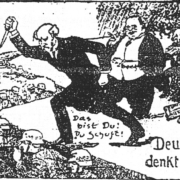Dolchstoss
A Dolchstoss, written in German as Dolchstoß, usually refers to an alleged political stab in the back, which a losing leader claims is entirely responsible for their defeat. This use of the word originates from the end of the First World War, when a change of government in Germany preceded the country’s decision to end the war and concede defeate, leading to the Armistice and then the Treaty of Versailles. Right-wing and militaristic elements in Germany then persistently claimed that they had not lost the war on the battlefield, but had been stabbed in the back and betrayed by weak-minded peace-loving politicians who robbed the nation of victory. These claims, also known as the Dolchstosslegende, or Stab In The Back Myth, were repeated up to, and throughout, the Nazi dictatorship under which Germany initiated the Second World War.
Germany had conclusively defeated Russia in 1917, freeing up military resources for the Western Front and bringing hopes of victory over France and Britain. Germany’s decision to resume unlimited U-boat warfare in 1917 was a gamble to speed the end of the war, which ran a high risk of drawing the United States into the war given the US policy reaction to earlier sinkings of their ships by German U-boats. The United States then declared war on Germany in 1917, and in 1918 the new weight of American arms and men and the force of new technology in the form of the battle tank decisively pushed the Germans back from August 2018.
Historians believe, as did the German military high command at the time, that Germany had conclusively lost the First World War in the autumn of 1918. Later claims of being stabbed in the back, the famous Dolchstoss, were a propaganda myth, know in German as the Dolchstoßlegende, or Stab In The Back Myth.




